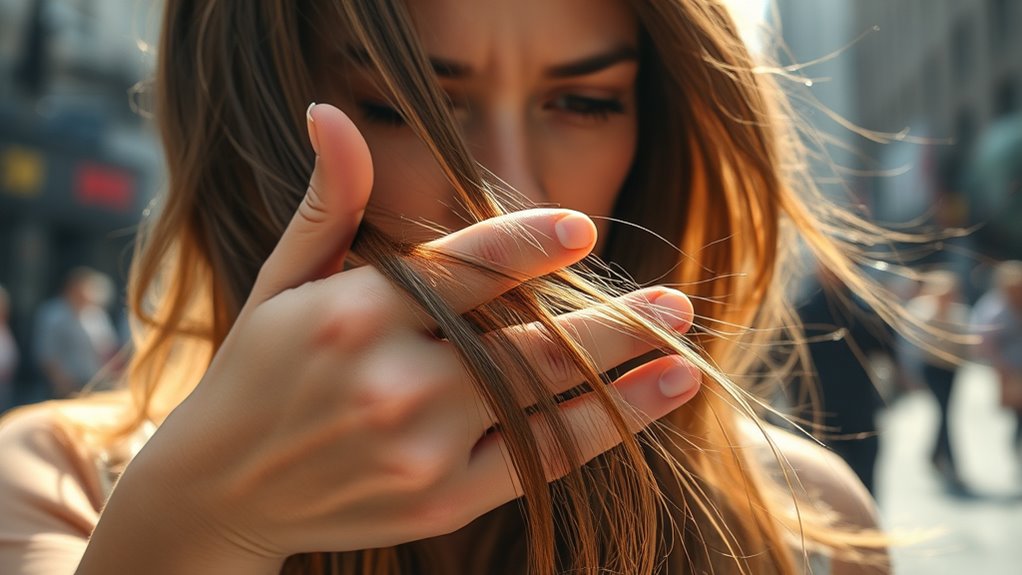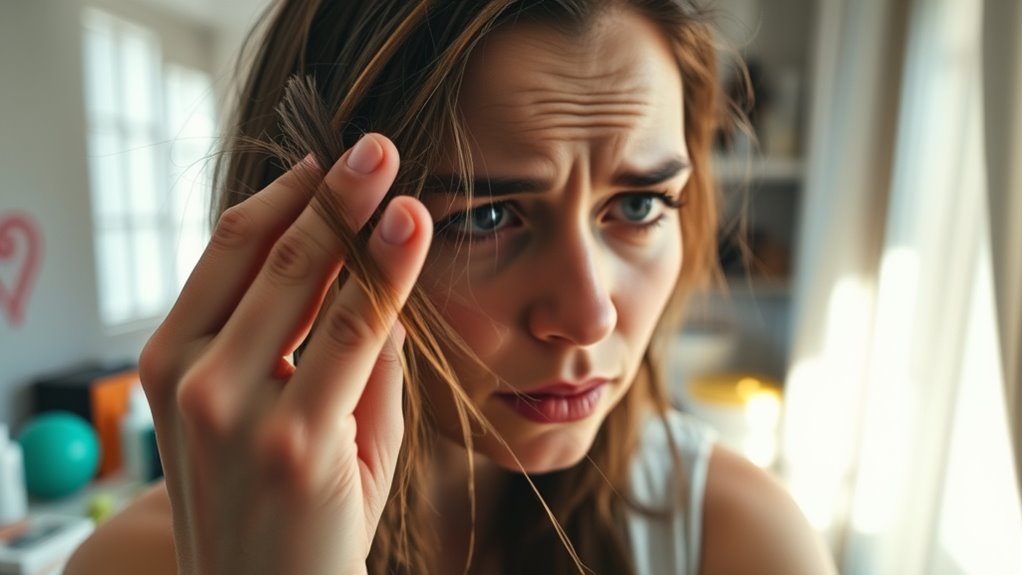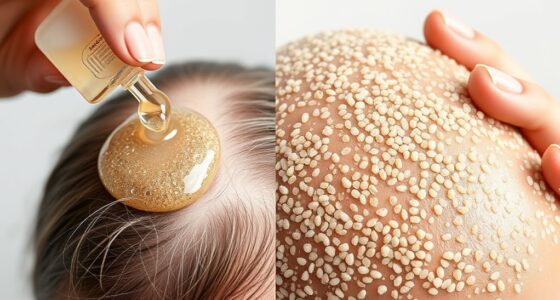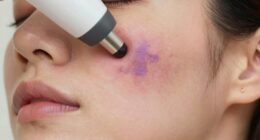Yes, stress can definitely make your hair fall out! When you’re stressed, your body releases cortisol, which disrupts the hair growth cycle. This can push hair follicles into a resting phase, causing increased shedding. Chronic stress, whether from work or personal issues, only worsens the problem. If you want to protect your hair health, managing stress is essential. There’s more to discover about the science behind stress and hair loss, so keep exploring further!
Key Takeaways
- Stress activates cortisol, which disrupts the hair growth cycle and can lead to increased hair shedding.
- Chronic emotional and physical stressors can trigger conditions like telogen effluvium, resulting in hair loss.
- Elevated cortisol levels shorten the hair growth (anagen) phase, prolonging the resting (telogen) phase and leading to hair fall.
- Stress hormones can inhibit hair follicle stem cell activity, preventing new hair growth from occurring.
- Effective stress management and a balanced diet can help protect hair health and mitigate stress-induced hair loss.

When you experience stress, you mightn’t realize its impact extends beyond your mental well-being—it can also lead to hair loss. You might be surprised to learn that cortisol, the stress hormone, plays a significant role in this process. Stress disrupts the hair growth cycle, particularly affecting the change from the growth phase to the resting phase, known as telogen. As a result, your hair follicles may enter an extended resting phase, leading to increased hair shedding. AI security measures can help organizations protect sensitive data, much like how effective stress management can safeguard your hair health.
Chronic stress, whether from work, relationships, or health issues, is a common trigger for hair loss. Even emotional stress from significant life events can heighten the risk of hair shedding. Physical stressors, like major surgery or illness, can also contribute. Hormonal changes that accompany stress further exacerbate these hair loss issues. You might notice that during periods of intense stress, like exams or life changes, your hair seems to thin out more than usual. Understanding the role of narcissistic behaviors in your relationships can help identify stress sources. As an example, jobs in healthcare and education are often demanding and can contribute to emotional stress.
Cortisol’s influence on hair growth is profound. Elevated levels of this hormone can shorten the anagen phase—the growth stage of hair—and prolong the telogen phase, resulting in hair loss. In studies involving rodents, stress-induced levels of corticosterone produced similar effects, showing that stress hormones can drastically impede hair growth.
Curiously, when the source of stress is removed, rapid hair regrowth often follows, highlighting the significance of managing stress for hair health.
Stress hormones affect hair follicle stem cells indirectly by impacting the dermal papilla cells that lie beneath them. These dermal papilla cells are essential for activating hair follicle stem cells. Stress inhibits the release of important activating molecules like Gas6, leaving hair follicle stem cells dormant and unable to initiate new hair growth. Targeting Gas6 could potentially restore hair growth, even under chronic stress conditions.
Conditions like telogen effluvium, where stress triggers premature entry into the resting phase, lead to excessive shedding. Trichotillomania, an emotional condition where individuals pull their hair out due to stress, also contributes to hair loss. Additionally, stress can exacerbate autoimmune conditions like alopecia areata, further complicating the issue.
While stress doesn’t directly cause these conditions, it can certainly contribute to their onset or worsening. Additionally, maintaining a balanced diet, rich in nutrients from plant sources, may support overall hair health and resilience against stress-induced hair loss.
Understanding the connection between stress and hair loss can empower you to take proactive measures for your hair health. By managing stress effectively, you may not only protect your mental well-being but also keep your hair intact.
Frequently Asked Questions
Can Hair Loss From Stress Be Reversed?
Absolutely, you can reverse hair loss from stress!
Picture yourself embracing calmness, practicing yoga under a serene sky, while nourishing your body with vibrant, healthy foods.
As you breathe deeply, stress melts away, and your hair starts to flourish again.
Regular scalp massages invite life back to your roots, while gentle hair care protects your strands.
With patience and dedication, your luscious locks will thrive, regaining their full glory in no time!
How Long Does Stress-Related Hair Loss Last?
Stress-related hair loss usually lasts about three to six months.
Once you reduce your stress levels, you can expect hair regrowth to begin within that timeframe.
However, if stress continues or if hair loss persists, it might signal an underlying medical issue that needs attention.
To help mitigate this, focus on stress management techniques and maintain a balanced diet to support your hair’s health and promote recovery.
Are Certain Hair Types More Prone to Stress-Induced Loss?
When it comes to stress-induced hair loss, it’s not a one-size-fits-all situation.
You might find that all hair types can be affected, but the impact varies based on your individual hair health and genetics.
If your hair’s already brittle or dry, it could show signs of stress more than healthier strands.
Generally, stress-related hair loss shows up a few months after a stressful event, so keep an eye on those changes!
What Are the Best Treatments for Stress-Related Hair Loss?
For stress-related hair loss, consider a combination of treatments.
Topical options like minoxidil can boost hair growth, while corticosteroids may help with conditions like alopecia areata.
Don’t underestimate lifestyle changes; a balanced diet, regular exercise, and stress management techniques like yoga can make a difference.
Make certain you’re getting enough sleep and hydration too.
If you’re unsure, consulting a doctor for personalized advice can really help you tackle the issue effectively.
Does Nutrition Play a Role in Stress-Related Hair Loss?
Absolutely, nutrition plays an essential role in stress-related hair loss.
When you’re stressed, it can lead to poor eating habits, resulting in deficiencies of essential nutrients like iron and zinc. These deficiencies can weaken your hair.
Conclusion
To sum up, while stress might not be the sole villain behind hair loss, it definitely plays a significant role. You may find that your hair feels like it’s staging a dramatic exit during tough times. By managing stress through techniques like mindfulness or exercise, you can help protect your precious locks. Remember, your hair deserves all the love, so don’t let stress steal away your confidence and shine!








